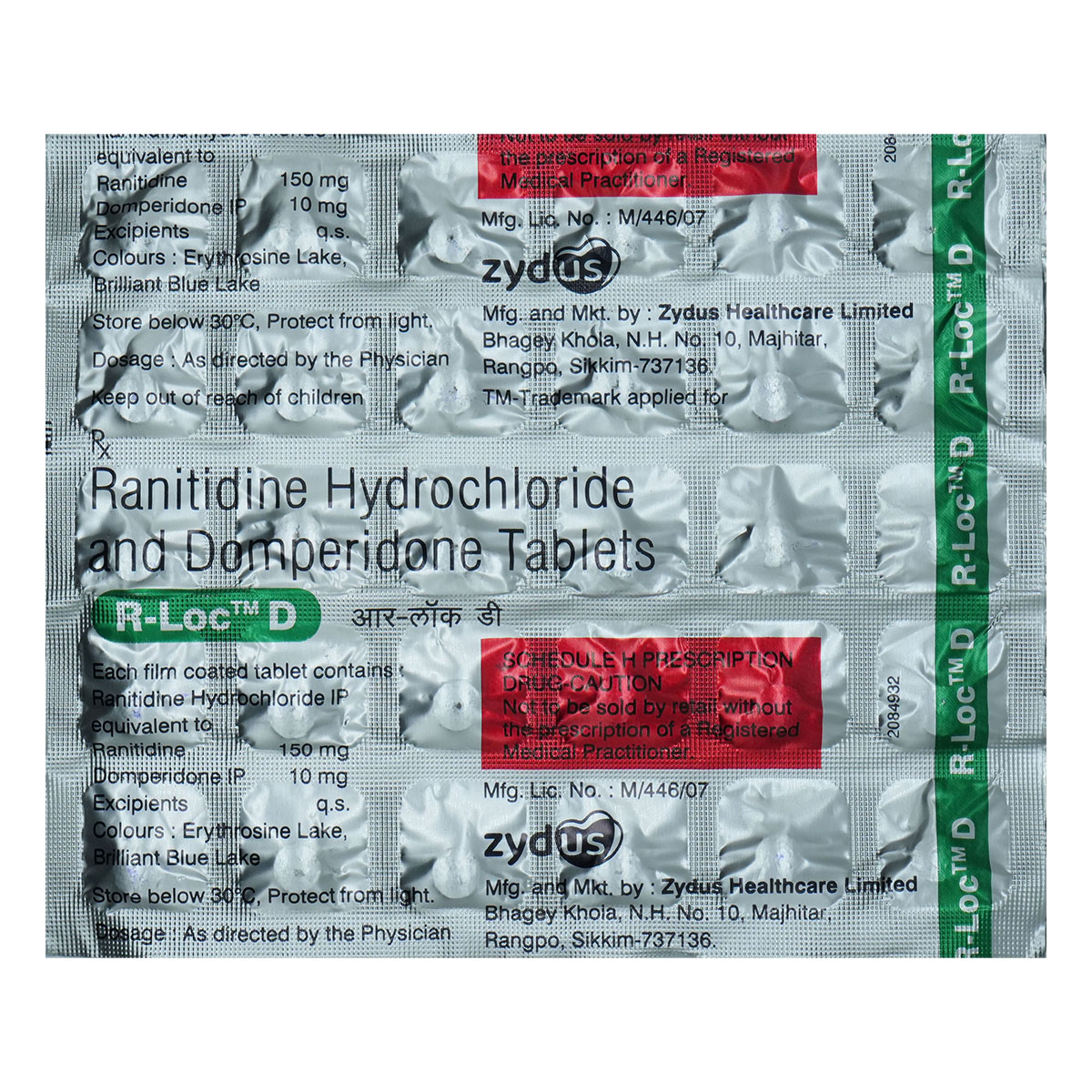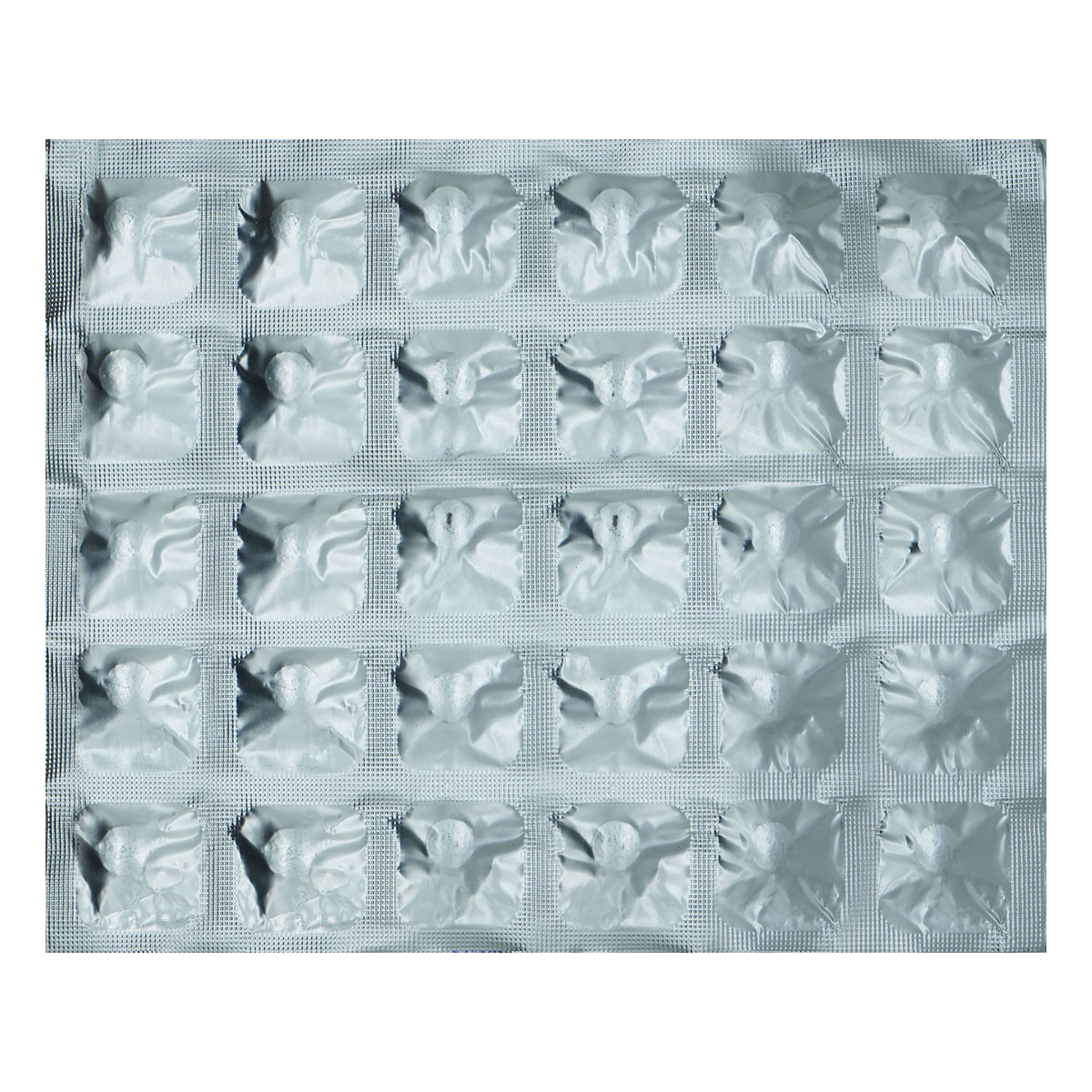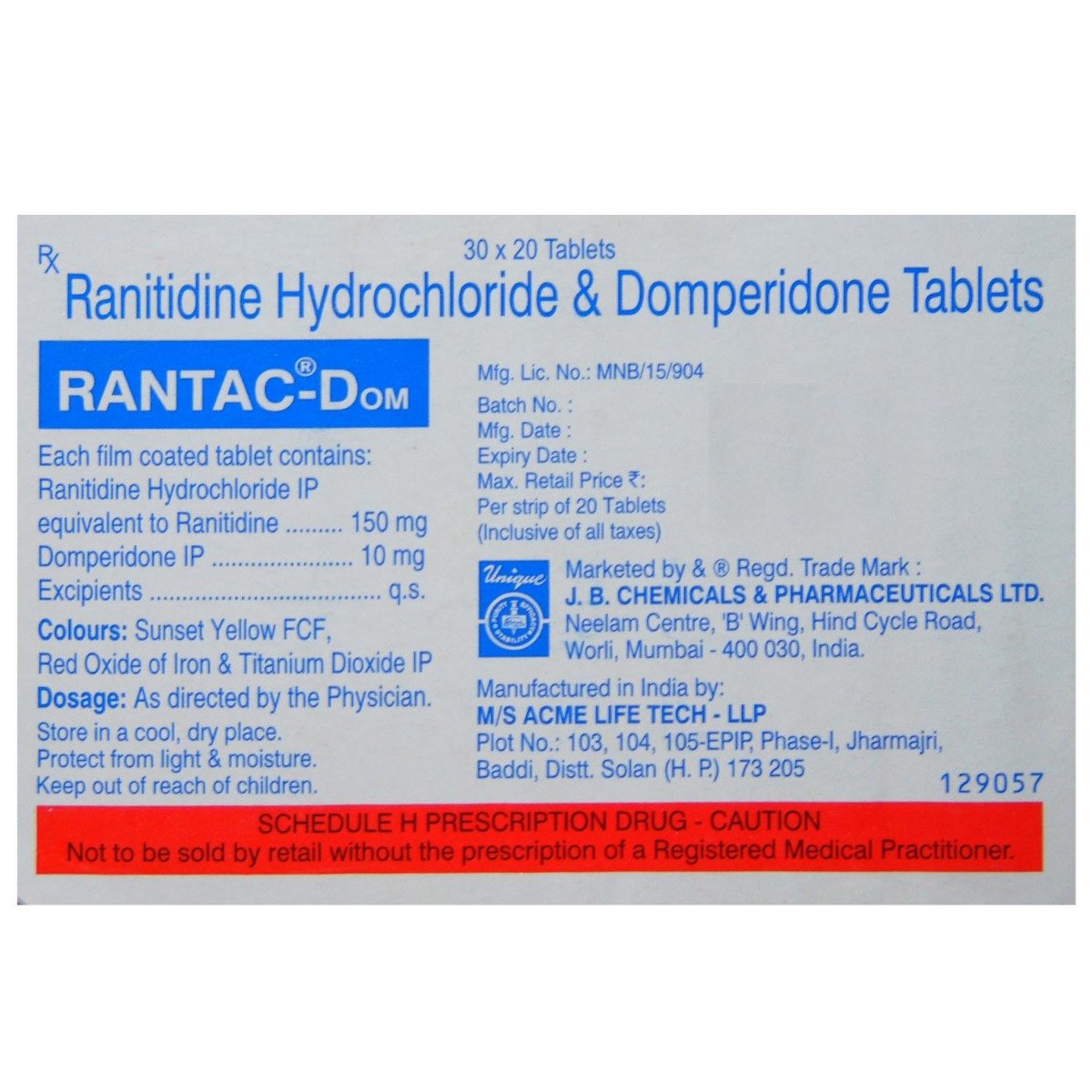R-Loc D Tablet 30's
MRP ₹45
(Inclusive of all Taxes)
₹6.8 Cashback (15%)
Selected Pack Size:30
30 ₹40.5
(₹1.35 per unit)
In Stock
15 ₹40.5
(₹2.7 per unit)
In Stock
Provide Delivery Location
Online payment accepted
 Prescription drug
Prescription drugWhats That
Composition :
Manufacturer/Marketer :
Consume Type :
Expires on or after :
Return Policy :
About R-Loc D Tablet
R-Loc D Tablet belongs to a group of medicines called gastrointestinal agents used to treat gastro-oesophageal reflux disease (GERD) and peptic ulcers. Gastroesophageal reflux disease (GERD) occurs when stomach acid frequently flows back into the food pipe (oesophagus). Peptic ulcers are sores that develop on the inner lining of the intestine and stomach.
R-Loc D Tablet is a combination of two drugs, namely: Ranitidine (H2 receptor antagonist) and Domperidone (a dopamine antagonist). Ranitidine works by blocking histamine H2 receptors located on the stomach lining, thereby reducing gastric acid secretion. Domperidone works by increasing the movements and contractions of stomach muscles. Together, R-Loc D Tablet helps in treating acidity.
You are advised to take R-Loc D Tablet for as long as your doctor has prescribed it for you depending on your medical condition. In some cases, you may experience certain common side-effects such as dry mouth, stomach pain, constipation, headache, sleepiness, and dizziness. Most of these side-effects do not require medical attention and will resolve gradually over time. However, you are advised to talk to your doctor if you experience these side-effects persistently.
Consult your doctor if you are pregnant or breastfeeding. R-Loc D Tablet may cause sleepiness and dizziness, so drive only if you are alert. R-Loc D Tablet should not be given to children as safety has not been established. Avoid consuming alcohol along with R-Loc D Tablet as it could lead to increased drowsiness and can elevate the production of stomach acid. Keep your doctor informed about all the medicines and your health condition to rule out any side-effects.
Uses of R-Loc D Tablet
Directions for Use
Key Benefits
R-Loc D Tablet belongs to a group of medicines called gastrointestinal agents used to treat gastro-oesophageal reflux disease (GERD) and peptic ulcers. R-Loc D Tablet is a combination of two drugs, namely: Ranitidine (H2 receptor antagonist) and Domperidone (a dopamine antagonist). Ranitidine works by blocking histamine H2 receptors located on the stomach lining, thereby reduces gastric acid secretion. Domperidone works by increasing the movements and contractions of stomach muscle. Together, R-Loc D Tablet helps in treating acidity.
Storage
- Inform your doctor about dry mouth symptoms. They may adjust your medication regimen or prescribe additional medications to manage symptoms.
- Drink plenty of water throughout the day to help keep your mouth moist and alleviate dry mouth symptoms.
- Chew sugar-free gum or candies to increase saliva production and keep your mouth moisturized.
- Use saliva substitutes, such as mouthwashes or sprays, only if your doctor advises them to help moisturize your mouth and alleviate dry mouth symptoms.
- Avoid consuming smoking, alcohol, spicy or acidic foods, and other irritants that may aggravate dry mouth symptoms.
- Schedule regular dental check-ups to keep track of your oral health and handle any dry mouth issues as they arise.
- Hydrate your body: Drink enough water to prevent dehydration and headaches.
- Calm Your Mind: Deep breathing and meditation can help you relax and relieve stress.
- Rest and Recharge: Sleep for 7-8 hours to reduce headache triggers.
- Take rest: lie down in a quiet, dark environment.
- Cold or warm compresses can help reduce tension.
- Stay Upright: Maintain good posture to keep symptoms from getting worse.
- To treat headaches naturally, try acupuncture or massage therapy.
- Over-the-counter pain relievers include acetaminophen and ibuprofen.
- Prescription Assistance: Speak with your doctor about more substantial drug alternatives.
- Severe Headaches: Seek emergency medical assistance for sudden, severe headaches.
- Frequent Headaches: If you get reoccurring headaches, consult your doctor.
- Headaches with Symptoms: Seek medical attention if your headaches include fever, disorientation, or weakness.
- Regular activity including cardio and weightlifting can help in weight loss and breast tissue reduction.
- Limit alcohol intake to lower your chances of gynecomastia and hormonal changes.
- Eat a balanced diet and avoid foods high in estrogen-like compounds.
- Follow your doctor's instructions take medication consistently to reduce breast enlargement and do not stop taking medication on your own.
- Eat a balanced diet rich in fruits, vegetables, whole grains, and healthy fats.
- Engage in regular moderate exercise, avoiding excessive strenuous activity.
- Practice relaxation techniques like deep breathing, meditation, or yoga to manage stress.
- Ensure adequate sleep and hydration.
- Track your menstrual cycle to monitor patterns and symptoms.
- Increase calorie intake and aim for a healthy energy balance.
- Prioritize healthy fats annd take omega-3 rich foods like fatty fish, avocado, nuts, and seeds.
- Eat complex carbohydrates like whole grains like brown rice, quinoa, whole wheat bread, and oats.
- Ensure adequate protein intake like lean protein sources like chicken, fish, beans, lentils, and tofu.
- Include calcium-rich foods such as dairy products like milk, yogurt, and fortified plant-based options.
- Consume vitamin D sources like fortified milk, fatty fish, or consider supplementation.
- Practice relaxation techniques like yoga, meditation, and deep breathing exercises to manage stress.
- Do moderate exercise and reduce intensity or duration to prevent hormonal disruption.
- Aim for 7-8 hours of restful sleep each night to help your body and mind recharge.
- Stay hydrated by drinking plenty of water.
- Maintain a healthy body weight through balanced diet and exercise.
- Consult a healthcare professional before making significant dietary changes, especially if suspecting a medical cause for amenorrhea.
Drug Warnings
Do not take R-Loc D Tablet if you are allergic to any of its contents. Inform your doctor before taking R-Loc D Tablet if you have a history of gastrointestinal bleeding, porphyria, or intestinal obstruction. R-Loc D Tablet may cause B12 deficiency in long-term treatment. Consult your doctor if you are pregnant or breastfeeding. R-Loc D Tablet may cause sleepiness and dizziness, so drive only if you are alert. R-Loc D Tablet should not be given to children as safety has not been established. Avoid consuming alcohol along with R-Loc D Tablet as it could lead to increased drowsiness and can elevate the production of stomach acid.
Drug-Drug Interactions
Drug-Drug Interactions
Login/Sign Up
Coadministration of R-Loc D Tablet with Cisapride can increase the blood levels of R-Loc D Tablet.
How to manage the interaction:
There may be a possibility of interaction between R-Loc D Tablet and Cisapride, but it can be taken if prescribed by a doctor. In case you experience any side effects like swelling of the ankles or feet, unusual tiredness, redness, changes in menstrual ability, contact a doctor. It is recommended to do this to ensure your heart stays healthy. Do not stop using any medications without talking to a doctor.
Coadministration of R-Loc D Tablet with Methadone can Increase the risk of irregular heart rhythm.
How to manage the interaction:
Although taking R-Loc D Tablet and Methadone together can cause an interaction, it can be taken if your doctor has suggested it. If you experience lightheadedness, tiredness, increased heart rate, consult a doctor. Do not discontinue any medications without consulting a doctor.
Coadministration of R-Loc D Tablet with Clarithromycin can increase the risk of side effects.
How to manage the interaction:
There may be a possibility of interaction between R-Loc D Tablet and Clarithromycin, but it can be taken if prescribed by a doctor. Do not stop using any medications without talking to a doctor.
Coadministration of R-Loc D Tablet with Toremifene can Increase the risk of irregular heart rhythm.
How to manage the interaction:
Although taking R-Loc D Tablet and Toremifene together can cause an interaction, it can be taken if your doctor has suggested it. If you experience lightheadedness, tiredness, increased heart rate, consult a doctor. Do not discontinue any medications without consulting a doctor.
Coadministration of R-Loc D Tablet with Ketoconazole can Increase the risk of irregular heart rhythm.
How to manage the interaction:
Although taking R-Loc D Tablet and Ketoconazole together can cause an interaction, it can be taken if a doctor has suggested it. If you experience lightheadedness, tiredness, increased heart rate, consult a doctor. Do not discontinue any medications without consulting a doctor.
Coadministration of R-Loc D Tablet with Nefazodone can increase the blood levels of R-Loc D Tablet.
How to manage the interaction:
There may be a possibility of interaction between R-Loc D Tablet and Nefazodone, but it can be taken if prescribed by a doctor. In case you experience any side effects like swelling of the ankles or feet, unusual tiredness, redness, changes in menstrual ability, contact a doctor. It is recommended to do this to ensure your heart stays healthy. Do not stop using any medications without talking to a doctor.
Coadministration of R-Loc D Tablet with Citalopram can Increase the risk of irregular heart rhythm.
How to manage the interaction:
Although taking R-Loc D Tablet and Citalopram together can cause an interaction, it can be taken if your doctor has suggested it. If you experience lightheadedness, tiredness, increased heart rate, consult a doctor. Do not discontinue any medications without consulting a doctor.
Coadministration of R-Loc D Tablet with Ritonavir can increase the blood levels of R-Loc D Tablet.
How to manage the interaction:
There may be a possibility of interaction between R-Loc D Tablet and Ritonavir, but it can be taken if prescribed by a doctor. In case you experience any side effects like swelling of the ankles or feet, unusual tiredness, redness, changes in menstrual ability, contact a doctor. It is recommended to do this to ensure your heart stays healthy. Do not stop using any medications without talking to a doctor.
Coadministration of R-Loc D Tablet with Halofantrine can Increase the risk of irregular heart rhythm.
How to manage the interaction:
Although taking R-Loc D Tablet and Halofantrine together can cause an interaction, it can be taken if your doctor has suggested it. If you experience lightheadedness, tiredness, increased heart rate, consult a doctor. Do not discontinue any medications without consulting a doctor.
Combining Mizolastine with R-Loc D Tablet can increase the risk or severity of irregular heart rhythms.
How to manage the interaction:
Although taking R-Loc D Tablet and Mizolastine together can cause an interaction, it can be taken if your doctor has suggested it. However, if you experience sudden dizziness, lightheadedness, fainting, shortness of breath, chest pain or tightness, rapid heartbeat, contact a doctor immediately. Do not discontinue any medications without consulting a doctor.
Drug-Food Interactions
Drug-Food Interactions
Login/Sign Up
Diet & Lifestyle Advise
- Eat smaller meals more often.
- Avoid smoking and alcohol consumption. Alcohol intake leads to increased production of stomach acid, thereby increases acidity and heartburn.
- Maintain a healthy weight by regular exercising.
- Avoid lying down after eating.
- Avoid tight-fitting clothes.
- Maintain a healthy weight by regular exercising.
- Practise relaxation techniques and avoid stress by doing yoga or meditation.
- Avoid foods such as high-fat food, spicy food, chocolates, citrus fruits, pineapple, tomato, onion, garlic, tea and soda.
- Avoid sitting continuously as it may trigger acidity. Take a break of 5 minutes every hour by doing brisk walking or stretching.
Side Effects of R-Loc D Tablet
- Dry mouth
- Stomach pain
- Constipation
- Headache
- Sleepiness
- Dizziness
Habit Forming
Therapeutic Class
All Substitutes & Brand Comparisons
RX
Out of StockCypatec D 10mg/150mg Tablet
₹5.9
(₹0.53 per unit)
60% CHEAPERRX
Out of StockGertac DM Tablet
Zydus Cadila
₹6.12
(₹0.55 per unit)
59% CHEAPERRX
Out of StockAztec D 10mg/150mg Tablet
Ind Swift Laboratories Ltd
₹6.25
(₹0.56 per unit)
58% CHEAPER
Author Details
We provide you with authentic, trustworthy and relevant information
Drug-Diseases Interactions
Drug-Diseases Interactions
Login/Sign Up
FAQs
R-Loc D Tablet is a combination of two drugs, namely: Ranitidine (H2 receptor antagonist) and Domperidone (a dopamine antagonist). Ranitidine works by blocking histamine H2 receptors located on the stomach lining, thereby reduces gastric acid secretion. Domperidone works by increasing the movements and contractions of stomach muscle. Together, R-Loc D Tablet helps in treating acidity.
Talk to your doctor if you do not feel better even after taking R-Loc D Tablet for 7 days. Do not take R-Loc D Tablet for longer durations unless prescribed by the doctor.
Constipation might be a side-effect of R-Loc D Tablet . Drink enough fluids and eat fibre rich food if you experience constipation.
Avoid lying down immediately after meals to prevent acid reflux. Raise the head of the bed 10-20cm by putting a pillow so that the head and chest are above the waist. This helps in preventing acid reflux.
Dry mouth could be a side-effect of R-Loc D Tablet . Limiting caffeine intake, avoiding smoking and mouthwashes containing alcohol, drinking water regularly, and chewing sugar-free gum/candy might help in stimulating saliva and thereby prevents drying of the mouth.
R-Loc D Tablet contains domperidone which helps in treating nausea and vomiting. However, R-Loc D Tablet is used to treat acidity. Please consult your doctor, he/she may prescribe you an alternate medicine for treating nausea and vomiting.
Drug-Drug Interactions Checker List
- ACETAMINOPHEN
- NAPROXEN
- ASPIRIN
- IBUPROFEN
- METHADONE
- DULOXETINE
- CITALOPRAM
- ESCITALOPRAM
- CYANOCOBALAMIN
- KETOCONAZOLE
- FLUCONAZOLE
- VORICONAZOLE
- ERYTHROMYCIN
- CLARITHROMYCIN
- TELITHROMYCIN
- MOXIFLOXACIN
- PROPRANOLOL
- PROCAINAMIDE
- AMIODARONE
- DRONEDARONE
- QUINIDINE
- DISOPYRAMIDE
- DOFETILIDE
- SOTALOL
- DILTIAZEM
- VERAPAMIL
- HALOPERIDOL
- PIMOZIDE
- SERTINDOLE
- CISAPRIDE
- DOLASETRON
- MIZOLASTINE
- VANDETANIB
- DIAZEPAM
- PHENYTOIN
- THEOPHYLLINE
- WARFARIN
- GLIPIZIDE
- HALOFANTRINE
- TELAPREVIR
- TOREMIFENE
- VINCAMINE
- DIPHEMANIL
- MEQUITAZINE
Disease/Condition Glossary
Gastroesophageal reflux disease (GERD): It occurs when stomach acid frequently flows back into the food pipe (oesophagus). This backflow (acid reflux) irritates the food pipe and causes heartburn. Symptoms include heartburn, sour or bitter taste in the mouth, and difficulty swallowing.
Peptic ulcers: Peptic ulcers are sores that develop on the lining of the stomach and intestine due to erosion of stomach's protective lining. Symptoms include nausea, changes in appetite, bloody or dark stools, unexplained weight loss, vomiting, and indigestion.

Have a query?
Alcohol
Safe if prescribed
Avoid consumption of alcohol while taking R-Loc D Tablet . Alcohol intake leads to increased production of stomach acid, thereby increases acidity and heartburn.
Pregnancy
Consult your doctor
Consult your doctor before taking R-Loc D Tablet if you are pregnant; your doctor will prescribe only if the benefits outweigh the risks.
Breast Feeding
Consult your doctor
Consult your doctor before taking R-Loc D Tablet ; your doctor will decide whether R-Loc D Tablet can be taken by breastfeeding mothers or not.
Driving
Safe if prescribed
R-Loc D Tablet may cause dizziness and sleepiness. Do not drive or operate machinery unless you are alert.
Liver
Consult your doctor
Dose adjustment may be needed. Consult your doctor before taking R-Loc D Tablet if you have a liver impairment or any concerns regarding this.
Kidney
Consult your doctor
Dose adjustment may be needed. Consult your doctor before taking R-Loc D Tablet if you have kidney impairment or any concerns regarding this.
Children
Safe if prescribed
R-Loc D Tablet should not be given to children as the safety and effectiveness were not established.











_0.jpg?tr=q-85)

